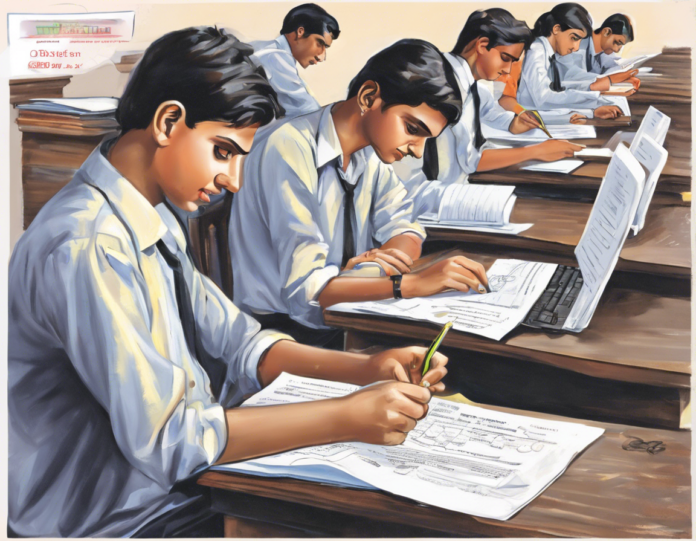The Maharashtra State Board of Secondary and Higher Secondary Education (MSBSHSE) conducts the Secondary School Certificate (SSC) examination for Class 10 students in the state of Maharashtra. This examination is a crucial milestone in a student's academic journey as it plays a significant role in shaping their future academic and career prospects. In this article, we will delve into tips and strategies to help students effectively prepare for and excel in the MSBSHSE SSC exam.
Understanding the Exam Pattern
Before diving into exam preparation, it is essential to have a thorough understanding of the exam pattern. The MSBSHSE SSC exam typically consists of six subjects, each carrying a specific weightage of marks. Students are evaluated through a combination of written exams and internal assessments conducted by their respective schools. Familiarizing yourself with the exam pattern will give you a clear idea of the topics you need to focus on and the marking scheme.
Key Subjects
- Mathematics: Focus on understanding concepts and practicing numerical problems regularly.
- Science: Pay attention to both theoretical concepts and practical applications.
- Languages (English, Marathi, etc.): Enhance your reading, writing, and comprehension skills.
- Social Studies: Develop a strong understanding of historical events, geographical locations, and political systems.
- Additional Subjects: Depending on your chosen elective subjects, allocate study time accordingly.
Effective Study Techniques
Time Management
Managing your time efficiently is crucial when preparing for the MSBSHSE SSC exam. Create a study schedule that allocates ample time for each subject based on its weightage in the exam. Break down your study sessions into manageable chunks and take short breaks to maintain focus and productivity.
Revision Strategy
Regular revision is key to retaining information and reinforcing your understanding of concepts. Create summary notes for each subject, highlighting key points, formulas, and definitions. Regularly review these notes to ensure that you have a solid grasp of the material.
Practice Previous Years' Papers
Solving previous years' papers is an excellent way to familiarize yourself with the exam format, question types, and time constraints. Practice papers also help you identify areas of weakness that require additional focus. Aim to complete papers within the stipulated time to improve your time management skills.
Tips for Subject-Specific Preparation
Mathematics
- Focus on understanding fundamental concepts such as algebra, geometry, and trigonometry.
- Practice solving a variety of numerical problems to build proficiency and speed.
- Seek clarification from teachers or classmates on challenging topics.
Science
- Create visual aids such as diagrams and charts to aid in understanding complex scientific concepts.
- Conduct practical experiments at home to supplement theoretical learning.
- Stay updated on the latest scientific developments and discoveries.
Languages
- Read a variety of literary works to enhance vocabulary and language skills.
- Practice writing essays, letters, and reports to improve your written communication.
- Engage in group discussions and debates to enhance verbal communication skills.
Social Studies
- Develop a timeline of historical events to aid in memorization.
- Use maps and geographical tools to understand spatial relationships.
- Stay informed about current affairs and their impact on the social, political, and economic landscape.
Healthy Study Habits
Adequate Rest
Ensure that you are well-rested before and during the exam period. Quality sleep is essential for cognitive function and memory retention.
Balanced Diet
Maintain a nutritious diet rich in fruits, vegetables, and whole grains to support your overall health and well-being. Stay hydrated and avoid excessive consumption of caffeine or sugary snacks.
Physical Activity
Incorporate regular exercise into your routine to reduce stress, improve focus, and boost energy levels. Even short breaks for stretching or a quick walk can be beneficial.
Frequently Asked Questions (FAQs)
1. How can I manage exam stress effectively?
Exam stress is normal, but managing it is essential. Practice relaxation techniques such as deep breathing, meditation, or yoga. Stay organized, prioritize self-care, and seek support from teachers, parents, or counselors if needed.
2. Is it better to study alone or in a group?
Studying preferences vary among individuals. Some students benefit from group study sessions for collaborative learning and sharing perspectives, while others prefer studying alone for focused concentration. Experiment with both approaches to determine what works best for you.
3. How can I improve my memory retention for exams?
Effective study techniques such as spaced repetition, mnemonics, and mind mapping can enhance memory retention. Regular revision, adequate sleep, and a healthy lifestyle also contribute to improved cognitive function.
4. Should I start studying months before the exam or cram at the last minute?
Consistent study over an extended period is more effective than last-minute cramming. Start preparing early, break down the syllabus into manageable chunks, and revise regularly to build a strong foundation of knowledge.
5. How can I stay motivated during exam preparation?
Set realistic goals for yourself, celebrate small victories, and visualize success to stay motivated. Surround yourself with a positive environment, seek inspiration from successful individuals, and remind yourself of the long-term benefits of your hard work.
In conclusion, success in the MSBSHSE SSC exam requires a combination of diligent preparation, effective study strategies, and a healthy mindset. By following the tips and techniques outlined in this article and addressing common concerns through the FAQs, students can approach the exam with confidence and achieve their academic goals. Remember, consistency, perseverance, and self-discipline are the keys to cracking the exam and paving the way for a bright future.

